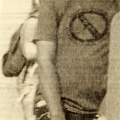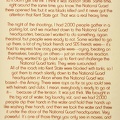Metro
Page 6-Rocky Mountain News, Denver, Colo. Sunday March 14, 1982
[Headline] Radical fights battles for handicapped
By Jerry Brown
News Staff
"This is what political organizing is all about," said Wade Blank as he mopped the kitchen floor in the home of a severely disabled client at the Atlantis Community for the handicapped.
"The secret to political organizing is providing services," he added while cleaning, dressing, feeding and collecting dirty laundry for Francis Peyrose. He is one of about 65 handicapped people who receives care from Atlantis at least twice daily at home.
"Most organizers don't realize that. A lot of my organizing friends give me a hard time for spending my time like this," said Blank.
Blank is co-founder and co-director of Atlantis, an organization dedicated to teaching handicapped people how to live outside the institutional confines of nursing homes and how to expand their civil rights.
He is best known in Denver for leading a series of highly publicized demonstrations against the Regional Transportation District for not providing better service to the handicapped. He and his followers blocked a bus for a day in 1978 and this year staged a sit-in at RTC headquarters.
Blank was born Dec. 4, 1940, grew up in Canton, Ohio-"Football Hall of Fame country." He lettered in football (didn't everybody?"), attended Muskingum College ("a small Christian college for small Christians" and became a Presbyterian minister and political follower of Richard Nixon and Barry Goldwater.
"In short," Blank said, "I was a classic white Anglo-Saxon Protestant male bigot."
But in the 1960s, Wade Blank became a radical-participating in civil rights demonstrations with Martin Luther King Jr., providing a meeting place for student racials from Kent State University at his church, which closed after the FBI began pressuring members of the congregation to find another place to worship, and helping draft resisters flee to Canada.
Blank attributes his political metamorphosis to the 1963 assassination of Presi-
[image]
[image caption] Wade Blank helps dress Francis Peyrose, one of about 65 residents who receive daily care at Atlantis Community. News Photo by Jon Gordon.
[text resumes]
-dent Kennedy and the political taunts of a black roommate at McCormick Theological College in Chicago, where he studied for the ministry.
The civil rights marches have ended, the Vietnam War is history and he no longer is an active minister.
But Blank remains a radical. And he is leading his own civil rights movement-on behalf of the physically handicapped.
Because of what he believes are significant political and social strides by Denver's handicapped community in recent years, Blank said Denver is rapidly becoming a mecca for the disabled.
Denver has more handicapped people per capita than any city in the United States, he said, with an estimated 16,000 residents who are confined to wheelchairs.
Blank moved to Denver in 1971 after taking a year off from his political and social battles to get a master's degree in the theology of rock music-a year he described as a "period of healing."
But he considers his theological thesis on the "new prophets" of rock music-The Who, Jethro Tull, Jefferson Airplane, Sly And The Family Stone, Joan Baez, Bob Dylan, Joni Mitchell and The Grateful Dead-one of his crowning achievements.
A copy of the thesis, written more than a decade ago, shares a spot in his personal scarpbook along with newspaper clippings of protest activities and political fights in which he has been involved.
Blank said he was suffering from political burnout when he moved to Denver. He spent his first few months in Colorado giving lectures on rock music and "learning the community."
He became an orderly in a nursing home, an experience that led the able-bodied Blank and Glen Kopp, who is disabled and confined to a wheelchair, to form Atlantis.
Nursing homes are little more than concentration camps, Blank said.
While working at Heritage House nursing home, which has a "youth wing" for the disabled, Blank and his staff began pushing such radical ideas as allowing their patients to have wine with their meals, set their own curfew hours and form a patient-run council that rated the performance of staff members.
There were failure; efforts to give the patients the right to hire and fire their nursing home attendants were unsuccessful.
The push for patient rights didn't sit well with owners of the nursing home, Blank said.
The final straw, Blank said, was when he and his staff began working on plans to move some of the patients out of the nursing home into houses in the neighborhood
The entire staff, except Blank, was fired, and "I was told I could stay only if I worked for the boss' son."
Blank resigned from the nursing home and helped start Atlantis.
The organization's dedication to getting
[image]
[image caption] Wade Blank as he appeared in the pre-radical days.
[text resumes] handicapped people out of nursing homes often puts Blank at odds with nursing homes and the families of the handicapped people he seeks to help.
Atlantis has ended up in court more than once and has won some notable legal battles along the way, Blank said.
In 1977, for example, Atlantis won a court battle allowing two of its clients to keep their baby despite their disabilities.
Atlantis twice has won court battles permitting its clients to continue living on their own, despite the objections of their families.
Drawing on his earlier experience a a civil rights and anti-war activist, Blank also has led protests by the handicapped on a variety of issues.
The series of demonstrations against RTC since 1978 to protest the lack of wheelchair-accesible service have gained the most publicity.
Under Blank's leadership, Atlantis also has fought to give the handicapped:
*Better educational opportunities.
*More political power by getting them to the polls (and making polling places accessible to people in wheelchairs).
*"The right to move up and down the streets" by persuading city officials to replace steep curbs with concrete ramps at many intersections.
Although Blank has severed his ties with the church, he refuses to renounce his ordination. He sees his involvement with Atlantis as a natural extension of his earlier work as a church minister.
But Blank also said he will stay at Atlantis only as long as he believes he can further the political rights of the handicapped.
If the day comes, he said, when there are no more political battles to be fought for the handicapped, it will be time to find a new cause.
[image that say Atlantis Community ]
- Created on
- Wednesday 24 July 2013
- Posted on
- Wednesday 9 October 2019
- Visits
- 172
- Rating score
- no rate
- Rate this photo


0 comments